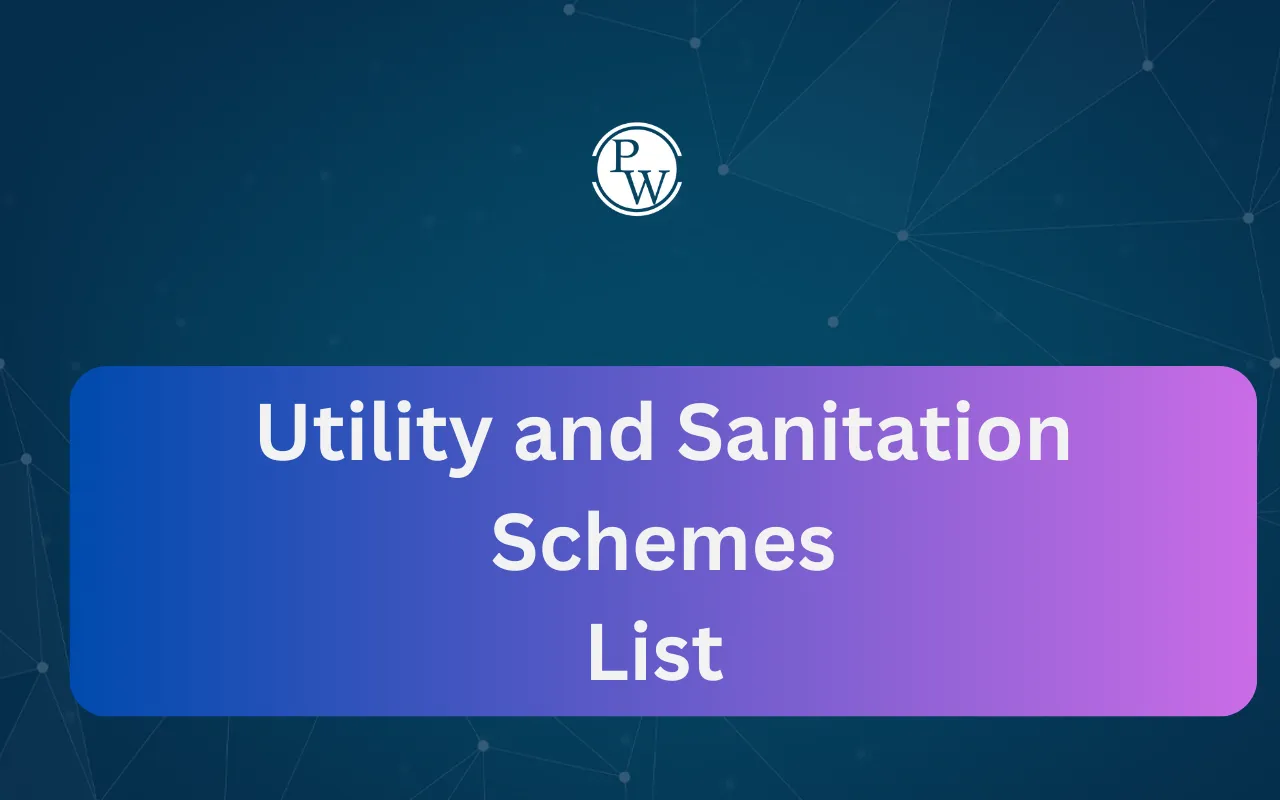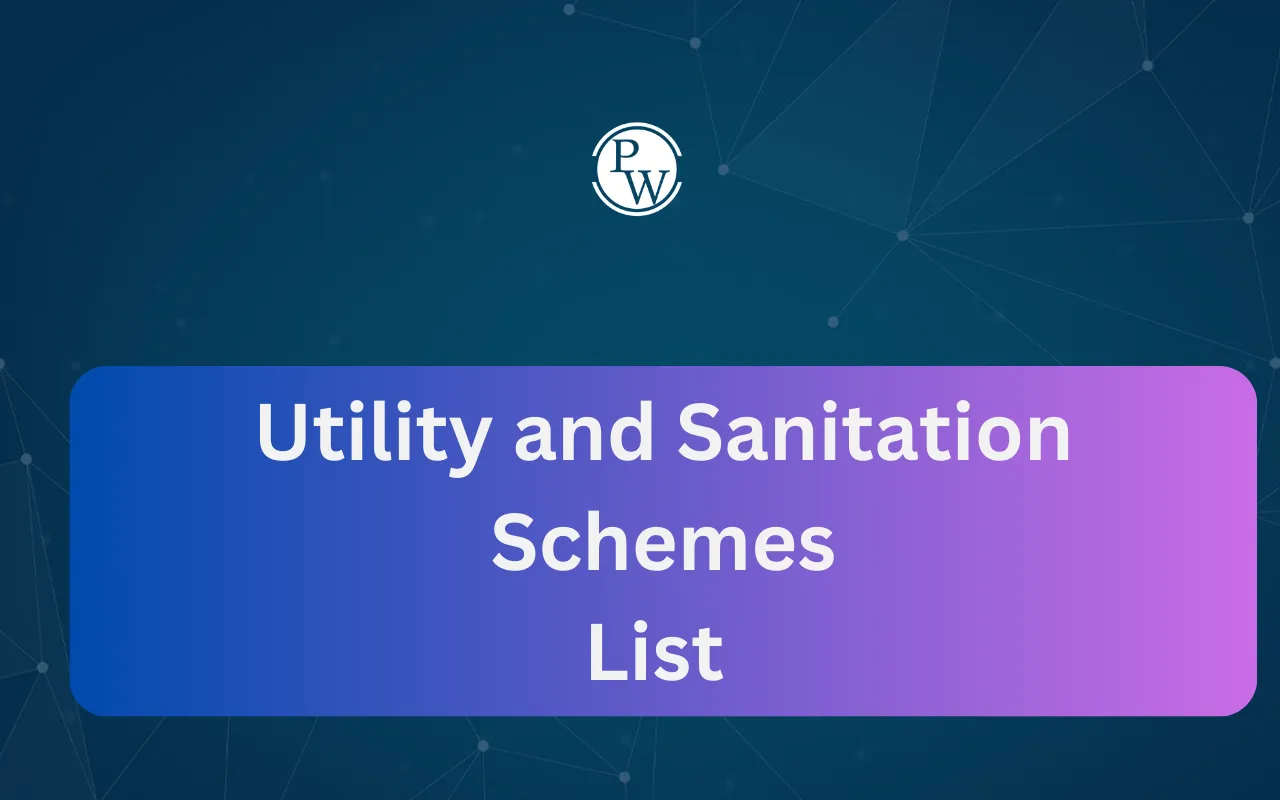

Utility and Sanitation Schemes have been launched to improve public health, community hygiene, water management, and more. All of these schemes have been designed to create and support clean environments. They look forward to safe water, modern toilets, and an efficient sanitation system in both rural and urban spaces.
In fact, in the year 2025, the governments of India continue to strengthen the utility and Sanitation Schemes through digital services, direct benefits, and community participation. Therefore, here we are to cover the Utility and Sanitation Schemes active in 2025. Furthermore, we are also going to include details related to the Swachh Bharat Mission, SBM beneficiary and more.
Utility and Sanitation Schemes Overview
Utility and Sanitation Schemes are meant to support services related to water supply, waste disposal, toilet construction, and more. These schemes focus on digital services like online applications, status checking, and problem solving.
In today’s time, these schemes have been playing an important role in improving the social well-being, reducing health risks, and more. Therefore, Ulitility and Sanaitation schemes over the time has become highly important. Through these schemes a sustainable future and sanitation growth can be achieved.
List of Utility and Sanitation Schemes 2025
Below is a list of important Utility and Sanitation Schemes active in 2025:
| List of Utility and Sanitation Schemes 2025 | ||
| S.No. | Scheme Name | Purpose |
| 1 | Swachh Bharat Mission (SBM) | Supports toilet construction and sanitation improvement. |
| 2 | SBM Gramin Phase II | Strengthens rural sanitation and solid-liquid waste management. |
| 3 | Jal Jeevan Mission | Provides functional household tap connections. |
| 4 | AMRUT 2.0 | Improves water supply and sewerage in cities. |
| 5 | Safai Mitra Suraksha Yojana | Ensures safety and training of sanitation workers. |
| 6 | Solid Waste Management Support Scheme | Funds waste collection, segregation, and processing. |
| 7 | Rural Waste Management Grants | Supports village-level waste solutions. |
| 8 | National Water Quality Monitoring Programme | Monitors safe drinking water. |
| 9 | Individual Household Latrine Scheme | Supports household toilet construction. |
| 10 | Community Sanitation Complex Support | Funds community toilets in rural regions. |
| 11 | Slum Sanitation Programme | Supports toilet access in slum areas. |
| 12 | Septic Tank Modernisation Scheme | Promotes safe desludging systems. |
| 13 | Smart City Sanitation Services | Modern sanitation under Smart Cities Mission. |
| 14 | Urban Waste Processing Grants | Supports city composting and waste-to-energy. |
| 15 | Water Supply Quality Testing Scheme | Ensures safe and clean drinking water. |
| 16 | Drainage Infrastructure Development Scheme | Strengthens village and urban drainage networks. |
| 17 | National Faecal Sludge Management Programme | Promotes safe sludge treatment. |
| 18 | Eco-friendly Toilet Promotion Scheme | Supports bio-toilet and mobile toilet units. |
| 19 | Digital Grievance Management for Sanitation | Online complaint system for civic sanitation issues. |
| 20 | Public Health Sanitation Drive | Promotes cleanliness and hygiene awareness. |
These Utility and Sanitation Schemes help the government extend sanitation coverage across India and ensure cleaner surroundings for all citizens.
Rural Sanitation Programmes in India
Rural sanitation programmes in India focus on improving cleanliness, reducing open defecation, and strengthening waste management systems in villages. Many Utility and Sanitation Schemes are designed specifically for rural households. The major rural sanitation programmes in India include:
-
Swachh Bharat Mission Gramin
-
SBM Gramin Phase II
-
Community Sanitation Complex Scheme
-
Rural Solid and Liquid Waste Management Programme
-
Jal Jeevan Mission (for clean water supply)
-
Rural Drainage and Wastewater Support Programme
-
Eco-Friendly Toilet Support
-
Women and Child Sanitation Support Schemes
-
Tribal Area Sanitation Improvement Programme
These programmes aim to provide access to safe toilets, clean water, and proper waste management facilities. The rural sanitation programmes in India also support behaviour change, hygiene awareness, and community-led sanitation initiatives.
What is Swachh Bharat Mission?
Swachh Bharat Mission (SBM) is a national sanitation programme launched to improve cleanliness and hygiene across India. It is one of the most important Utility and Sanitation Schemes and is linked to rural sanitation programmes in India and urban sanitation development.
Listed below are key features of Swachh Bharat Mission:
-
Household toilet construction
-
Community toilet facilities
-
Solid-liquid waste management
-
Awareness on cleanliness
-
Behaviour change campaigns
-
Digital tracking of sanitation progress
-
Financial support for eligible households
SBM Gramin and SBM Urban work together to improve sanitation across rural and urban regions.
SBM Beneficiary List
The SBM beneficiary list includes the names of households that have received support for toilet construction under the Swachh Bharat Mission. Beneficiaries receive assistance based on eligibility rules, local verification, and scheme guidelines.
The SBM beneficiary list includes:
-
Name of the sanctioned household
-
Village and district details
-
Status of toilet construction
-
Amount sanctioned
-
Work completion status
Citizens can view the SBM beneficiary list through the official portal using simple steps.
Swachh Bharat Mission Gramin Toilet Online Apply
Eligible rural households can apply under Swachh Bharat Mission Gramin Toilet Online Apply for support in building household toilets. Mentioned here are steps to apply to get seamless access:
-
Visit the official SBM Gramin portal.
-
Click on the online apply option for IHHL.
-
Fill in household details, Aadhaar, and location.
-
Upload required documents.
-
Submit the application.
-
Track application progress through the portal.
This process supports quick digital application and reduces delays in toilet construction assistance.
SBM Check Status 2025 Steps
Citizens who applied for benefits under SBM can use SBM Check Status 2025 to track their application or payment status.
Steps for SBM Check Status 2025:
-
Open the SBM official portal.
-
Select the “Check Status” option.
-
Enter registration number or mobile number.
-
Verify through OTP.
-
View application status, document status, and payment status.
Users can also use SBM check status by registration number for quick access.
Sanitation Schemes in India UPSC Relevance
Sanitation schemes in India hold high relevance for UPSC exams, especially for subjects like Polity, Governance, Social Justice, and Current Affairs. Utility and Sanitation Schemes often appear in prelims, mains, and essay topics.
UPSC relevance includes:
-
Understanding rural sanitation programmes in India
-
Knowing the purpose and features of Swachh Bharat Mission
-
Learning about waste management and hygiene policies
-
Tracking yearly updates of sanitation schemes in India UPSC notes
-
Analysing gaps and progress in national sanitation coverage
UPSC aspirants should remember the scheme objectives, year of launch, implementing ministries, and digital services such as SBM beneficiary list and status check.
